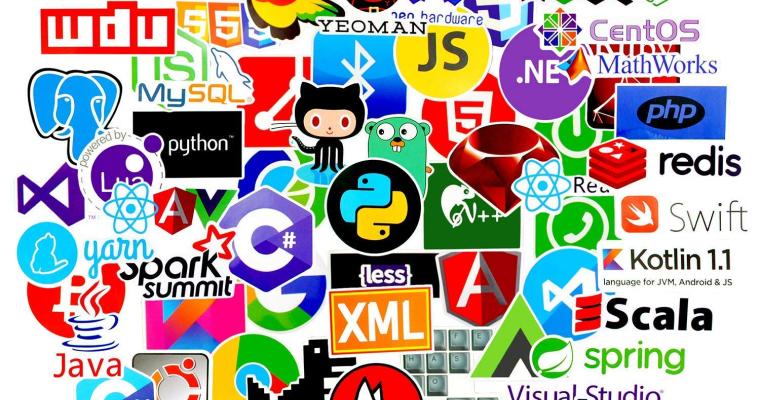Programming is one of the most in-demand skills today, especially in gaming. With the growth of the internet, blockchain, AR/VR, and mobile apps, developers are needed everywhere. If you want to enter this field, choosing the right programming language is key. Blockchain jobs have seen salaries rise by 514%, with U.S. developers now averaging $146K per year.

There are over 8,000 programming languages, but only a few are essential for game development. Below is an overview of the most popular ones, their main uses, and pros and cons.
Why Your Language Choice Matters
The gaming industry generated over $184 billion in 2024, and demand for skilled developers continues to surge. Blockchain gaming roles saw salary increases of 514%, with experienced developers earning $146K+ annually in the United States alone. But here’s the reality: not all programming languages are created equal for game development.
Your choice affects:
- Performance: Frame rates, load times, and player experience
- Platform compatibility: Mobile, console, PC, or web
- Development speed: Time from concept to playable prototype
- Career opportunities: Some languages open more doors than others
- Learning curve: Your time investment before becoming productive.
JavaScript – Web Gaming and Beyond
JavaScript has evolved from simple web interactions to powering full-featured games in browsers and mobile apps through frameworks like Phaser, Three.js, and React Native.
Why JavaScript remains relevant:
The web is the most accessible platform, requiring no downloads or installations. As HTML5 gaming grows and cross-platform frameworks mature, JavaScript offers unprecedented reach.
Best for:
- Browser-based games
- HTML5 casual games
- Mobile games via React Native or Ionic
- Multiplayer web games with Node.js backends
- Interactive storytelling and visual novels
- Educational games and simulations.
Pros:
-
Huge community and endless tutorials online
-
Works for both front-end and back-end (Node.js)
-
Easy to learn and fast to apply
Challenges:
- Performance limitations for complex 3D games
- Browser compatibility issues
- Security vulnerabilities in client-side code
- Memory management challenges in large projects
Career outlook: Full-stack JavaScript developers command $75K-$140K, with demand especially high for Node.js backend expertise.
Python – The Beginner’s Gateway and AI Powerhouse
Python isn’t typically used for performance-critical game code, but it’s become essential for game development pipelines, tools, and AI integration. Games like Battlefield 2 and World of Tanks use Python for scripting and automation.
Why Python matters in game development:
Python’s simplicity makes it perfect for learning programming fundamentals. More importantly, it’s become the language of AI and machine learning, which are increasingly important in modern video games development for NPC behavior, procedural generation, and player analytics.
Where it’s used:
-
Game development (Battlefield 2, World of Tanks)
-
Web frameworks and apps
-
Artificial Intelligence and Machine Learning
-
Data analytics and automation
- Scripting within game engines (Blender, Maya)
- Learning programming before tackling C++ or C#
Strengths:
- Easiest language to learn and read
- Massive ecosystem for AI, data science, and automation
- Used by major companies (Instagram, Spotify, YouTube)
- Excellent for rapid prototyping
- Free resources and tutorials everywhere
- Growing role in procedural generation and AI-driven gameplay
Challenges:
- Too slow for real-time game loops
- Not suitable as primary game engine language
- Dynamic typing can lead to runtime errors
- Limited mobile deployment options
Career outlook: Python specialists in game AI and tools programming earn $90K-$150K, with demand accelerating as AI integration grows.
Java – Android Gaming and Enterprise Solutions
Java built Minecraft, powers millions of Android games, and remains a stable choice for cross-platform development. While its popularity for new game projects has declined, it’s far from obsolete.
Why Java still matters:
Java’s “write once, run anywhere” philosophy and mature ecosystem make it reliable for Android development and large-scale multiplayer architectures.
Best for:
- Android mobile games
- Minecraft mods and plugins
- Server-side multiplayer systems
- Enterprise gaming applications
- Educational game projects
Strengths:
- Works across platforms (“write once, run anywhere”)
- Automatic memory management (garbage collection)
- Mature development tools and IDEs
- Strong for backend server logic
- Extensive third-party libraries
- Time-tested stability
- Famous games like Minecraft are built with Java
Challenges:
- Verbose syntax requires more code
- Performance gap compared to C++
- Oracle licensing considerations
- Declining popularity for new game projects
Career outlook: Android game developers earn $70K-$130K, with experienced backend Java developers commanding higher salaries.
C++ – The Industry Standard for AAA Games

C++ remains the undisputed king of high-performance game development. If you’ve played Counter-Strike, World of Warcraft, Doom, or used Unreal Engine, you’ve experienced C++ in action. It’s the foundation for many top games and game engines.
Where it’s used:
-
AAA video games (Counter-Strike, World of Warcraft, Doom)
-
Game engines (Unreal Engine)
-
Operating systems and high-performance software
Pros:
-
Very fast and efficient
-
Widely used in gaming and system programming
-
High salaries for C++ developers
-
Great for graphics-heavy games
Cons:
-
Harder to learn compared to Python or JavaScript
-
Manual memory management can cause bugs
-
Large projects compile slowly.
Career outlook: C++ developers are consistently in high demand at major studios. Salaries range from $80K for junior positions to $200K+ for senior graphics programmers.
C# with Unity – The Indie Developer’s Best Friend
C# (C-Sharp) is a Microsoft language that powers the Unity game engine, one of the most widely used tools for indie and mobile game development. From small studio hits to major titles, Unity’s accessibility has democratized game development.
Why C# and Unity work so well together:
Unity handles the complex engine work while C# provides a relatively gentle learning curve. You can go from zero to a playable prototype faster than any other professional game development path.
Where it’s used:
-
Unity engine (2D, 3D, VR, AR games)
-
Mobile games for Android/iOS
-
Windows applications
- Rapid prototyping and game jams
- First-time game developers
Strengths:
- Fastest path from beginner to published game
- Massive Unity Asset Store for ready-made components
- Excellent documentation and learning resources
- Strong community support and tutorials
- Cross-platform deployment with minimal changes
- Modern language features that prevent common bugs.
Cons:
-
Slower than C++ for graphics-heavy AAA titles
- Performance limitations compared to C++ for demanding projects
- Heavy dependence on Unity ecosystem
- Garbage collection can cause frame rate hitches
- Unity licensing costs for successful games.
Career outlook: Unity developers are highly sought after for mobile gaming studios. Entry-level positions start around $65K, with experienced developers earning $120K+.
Rust – The Modern Systems Programming Language
Rust is emerging as a serious contender in game engine development, offering C++-level performance with modern safety guarantees. While still gaining traction, forward-thinking developers are taking notice.
Why Rust is gaining momentum:
Rust eliminates entire categories of bugs that plague C++ (memory leaks, null pointer crashes) while maintaining comparable performance. Game engines like Bevy are demonstrating its potential.
Where it’s used:
- Custom game engine development
- Performance-critical subsystems
- Multiplayer server systems
- Modding frameworks and tools
- Long-term projects prioritizing maintainability.
Strengths:
- Memory safety without garbage collection overhead
- Concurrency without data races
- Performance matching C++
- Modern language design
- Growing ecosystem and community
Challenges:
- Steep learning curve, even for experienced developers
- Smaller ecosystem compared to established languages
- Fewer game-specific libraries
- Longer compilation times
Career outlook: Still emerging, but Rust specialists command premium salaries ($110K-$180K) due to scarcity.
Go (Golang) – Multiplayer Server Excellence
Go wasn’t designed for game development, but it’s become invaluable for game server infrastructure. Major online games use Go for matchmaking, chat systems, and backend services.
Why Go excels at server-side gaming:
Go’s concurrency model handles thousands of simultaneous players effortlessly, and its simplicity makes server code maintainable as teams scale.
Best for:
- Multiplayer game servers
- Matchmaking systems
- Real-time chat and social features
- API backends for mobile games
- Analytics and telemetry services
- DevOps tools and automation
Strengths:
- Exceptional concurrency handling
- Fast execution and low memory footprint
- Simple, clean syntax
- Built-in networking libraries
- Easy deployment (single binary)
- Strong standard library
Challenges:
- Not suitable for game client code
- Limited graphics capabilities
- Smaller game development community
- Fewer game-specific frameworks
Career outlook: Backend Go developers earn $100K-$160K, with gaming companies increasingly seeking this expertise.
Best Programming Languages for Games to Compare
| Language | Best For | Famous Games/Uses | Pros | Cons |
|---|---|---|---|---|
| JavaScript | Web & mobile games | Browser games, Node.js | Easy to learn, full-stack use, fast | Security issues, frequent bugs |
| Python | Beginners, AI, scripting | Battlefield 2, WoT | Simple, versatile, AI-ready | Slower than C++ |
| Java | Android & enterprise games | Minecraft | Platform-independent, reliable | Verbose, Oracle licensing fees |
| C++ | AAA & high-performance games | Unreal Engine, WoW, Doom | Fast, industry standard, flexible | Harder to learn, memory issues |
| C# | Indie, mobile, Unity engine | Unity-based titles | Beginner-friendly, Unity support | Not as fast as C++ |
| Rust | Game engines, secure code | Growing indie use | Safe, fast, modern | Small community, steep learning |
| Go | Multiplayer server backends | Game networking | Simple, fast, great for concurrency | Limited in graphics/gameplay |
Practical Decision Framework
Choose C++ if you:
- Want to work at AAA studios (EA, Ubisoft, Activision)
- Plan to develop custom game engines
- Need maximum performance for competitive or VR games
- Are willing to invest 6-12 months learning before productive work
- Target console platforms
Choose C# if you:
- Want to publish your first game within 3-6 months
- Focus on mobile or indie game development
- Value rapid prototyping and iteration
- Need cross-platform deployment
- Want the easiest path to earning revenue from games
Choose Python if you:
- Are completely new to programming
- Want to build game development tools
- Focus on AI-driven gameplay or procedural generation
- Plan to specialize in data analytics for games
- Want foundational skills before learning C++ or C#
Choose JavaScript if you:
- Target web browsers primarily
- Want global reach without app stores
- Build casual or educational games
- Need both client and server code in one language
- Prioritize instant playability over graphics fidelity
Choose Java if you:
- Focus exclusively on Android development
- Build Minecraft-related content
- Develop enterprise gaming applications
- Prefer mature, stable ecosystems
Choose Rust if you:
- Have experience with systems programming
- Build long-term projects where maintenance matters
- Develop multiplayer infrastructure requiring reliability
- Want cutting-edge language features with C++ performance
Choose Go if you:
- Specialize in backend/server development
- Build multiplayer infrastructure at scale
- Develop DevOps tools for game studios
- Handle concurrent connections efficiently
How to Choose the Right Language
-
If you want to make mobile or indie games → Start with C# (Unity).
-
If you want to create AAA high-performance games → Learn C++.
-
If you’re into AI or automation in games → Pick Python.
-
If you’re building web games or apps → Go with JavaScript.
-
If you want to specialize in multiplayer servers → Learn Go or Rust.
Current Industry Trends
Cross-Platform Dominance: Unity and Unreal Engine make it possible to deploy to PC, mobile, console, and VR from a single codebase. This trend favors C# and C++ developers.
AI Integration: Machine learning is revolutionizing NPC behavior, content generation, and player analytics. Python skills are becoming valuable even for traditional game programmers.
Cloud Gaming: Services like Xbox Cloud Gaming and GeForce NOW are shifting performance requirements, potentially reducing the need for extreme optimization.
Blockchain and Web3: Despite controversy, blockchain metaverse gaming is creating new opportunities for JavaScript and Rust developers.
Metaverse Platforms: Virtual world platforms require expertise in Unity/Unreal plus networking, combining multiple language skills.
Learning Path Recommendations
Absolute Beginner (No Programming Experience):
- Start with Python (2-3 months) to learn programming fundamentals
- Build simple text-based games
- Move to C# with Unity for visual games
- Learn game design principles alongside coding
Career Switcher (Has Programming Experience):
- If from web development → JavaScript game frameworks, then C# Unity
- If from software engineering → C# Unity for speed, C++ for depth
- If from data science → Python tools, then C# for implementation
Computer Science Student:
- Learn C++ for strong fundamentals and career value
- Supplement with C# for practical game completion
- Add Python for tools and AI specialization
Time to Productive:
- Python: 1-2 months to simple games
- C# with Unity: 2-3 months to publishable mobile game
- JavaScript: 2-3 months to browser game
- Java: 3-4 months to Android game
- C++: 6-12 months to professional-quality work
- Rust: 8-14 months including learning curve
The Multi-Language Reality
Professional game development rarely uses just one language. A typical commercial game might use:
- C++ for engine and performance-critical systems
- C# for gameplay scripting
- Python for build tools and automation
- JavaScript for web dashboard and analytics
- SQL for backend data storage
Don’t feel limited to one choice forever. Start with the language that matches your immediate goals, then expand systematically.
Your Next Steps
Week 1: Choose your initial language based on your primary goal (AAA vs indie vs web vs mobile).
Month 1: Complete a beginner course and build three tiny projects (even if they’re terrible).
Month 2-3: Recreate a classic game (Pong, Snake, Breakout) to understand game loops, input, and rendering.
Month 4-6: Start your first original game, keep it small and finishable.
Month 7+: Join game jams, collaborate with others, contribute to open-source game projects.
The Bottom Line
There’s no single “best” programming language for games. C++ powers the most impressive visual experiences. C# delivers the fastest path to published games. Python opens doors in AI and automation. JavaScript provides unmatched accessibility. Each serves specific needs in the vast gaming landscape.
Your best move? Choose the language that aligns with your project goals and career aspirations, commit to learning it deeply, then strategically add complementary skills. The gaming industry values specialists who can deliver in their chosen language more than generalists who dabble in many.
The world of game development is more accessible than ever, with free engines, abundant tutorials, and thriving communities. Your journey starts with a single choice—make it, stick with it, and start building. The games industry is waiting for what you’ll create.







